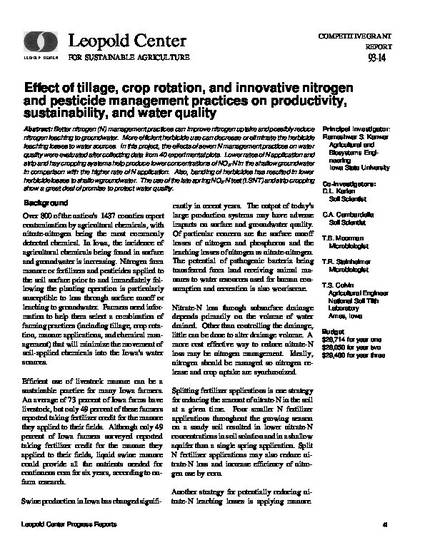
Unpublished Paper
Effect of tillage, crop rotation and innovative nitrogen and pesticide management practices on productivity, sustainability and water quality
Leopold Center Completed Grant Reports
Project ID
1993-14
Abstract
Better nitrogen (N) management practices can improve nitrogen uptake and possibly reduce nitrogen leaching to groundwater. More efficient herbicide use can decrease or eliminate the herbicide leaching losses to water sources. In this project, the effects of seven N management practices on water quality were evaluated after collecting data from 40 experimental plots. Lower rates of N application and strip and hay cropping systems help produce lower concentrations of NO3-N in the shallow groundwater in comparison with the higher rate of N application. Also, banding of herbicides has resulted in lower herbicide losses to shallow groundwater. The use of the late spring NO3-N test (LSNT) and strip cropping show a great deal of promise to protect water quality.
Principal Investigator(s)
Rameshwar S. Kanwar
Co-Investigator(s)
D. L. Karlen, C. A. Cambardella, T. B. Moorman, T. R. Steinheimer, T. S. Colvin
Year of Grant Completion
1997
Disciplines
Citation Information
Rameshwar S. Kanwar, Douglas Karlen, Cynthia A. Cambardella, Thomas B. Moorman, et al.. "Effect of tillage, crop rotation and innovative nitrogen and pesticide management practices on productivity, sustainability and water quality" (1997) Available at: http://works.bepress.com/douglas_karlen/5/
